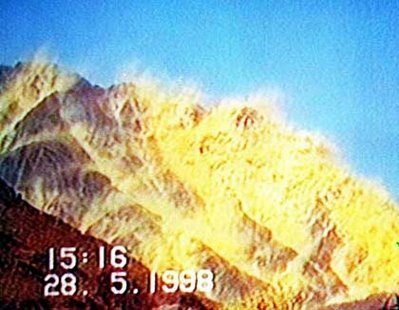
The News International Pakistan
May 20, 1998
Dr. S. Farooq Hasnat
Just a few days after the series of nuclear tests, on May 15th India officially declared itself a nuclear-weapon state. The Indian Prime Minister Atal Bihari Vajpayee stated that "India is now a nuclear power with a big bomb." Indian government and media had already created a frenzied environment where officials made repeated threats to the neighbouring Pakistan and China. Former foreign secretaries and chiefs of armed forces were paraded in front of TV cameras, uttering vehement contempt and insult for Pakistan. A routine diplomatic expression gave way to enormous inner hidden hatred.
The Hindu Fundamentalist Bharatiya Janata Party (BJP), shot itself in the foot with five nuclear bullets in Rajasthan, and as a fallout entangled Pakistan in the process as well. The form in which the nuclear episode took place has left us with only one option -- to demonstrate that Pakistan can deter as well as retaliate in case of a real nuclear threat from India. The old style "balance of terror" has revisited with South Asian attire and mechanism. We must call their bluff, otherwise be prepared to live as a subservient nation.
It is claimed by the Indian leadership that its country conducted the tests after 24 long years -- ignoring, conveniently the fact that it is after 24 years, since 1974, that for a first time, a chauvinist Hindu Fundamentalist Party - BJP is voted to power, whose leadership as well as rank and file is totally committed to the concept of "greater Hindu rule" in the area.
After the explosions the BJP went on with a systematic and well planned nationalistic sycophancy leaving little room for a rational opinion. Even the most balanced leaders and columnists were and are still taken over by the fast moving ambiance, resulting in little or no opposition against the Indian nuclear option. The BJP government perfected a war-hysteria kicked off by the Prime Minister. India very clearly announced that it had completed "a series of tests" -- implying that there could be more forthcoming. In this context, the reluctance of India to endorse the affirmed document of Comprehensive Test Ban Treaty (CTBT) is understandable.
On the military front, the BJP leadership made it clear that it is determined to cap its tested
missiles with nuclear warheads. Minister for Science and Technology Murli Manohar Joshi made it clear that the BJP government would soon implement its declared policy. The minister is quoted to have said on May 12 that "Indian scientists will put a nuclear warhead on missiles as soon as the situation requires. The Indian leadership justified the nuclear tests on the basis of security threats. First it was Pakistan alone, then came China. But in reality, as the Chinese spokesman said, it is the Indian hegemonic designs for South Asia, which prompted it to go nuclear.
It is clear that the BJP never abandoned its election manifesto of acquiring nuclear weapons capability. At least two more election promises are left to be executed. The first is the incorporation of the held Kashmir in the Indian Union and the second relates to "getting back;" the "Pakistani occupied Kashmir." In his post-nuclear letter to President Clinton and other world leaders, Prime Minister Vajpayee targeted Pakistan in half of his message. Kashmir and Punjab were mentioned as a core areas of security threat for India and thereby a rationale for the nuclear weapons. While looking at the track record of May 12 and 14, their is no reason that Vajapee's government would not implement the other sections of their election manifesto in letter and spirit.
The security situation for Pakistan's is grave. The Indians have collected a battery of guided missiles like Agni, with a range of 1,800 km, and Prithvi which is already deployed on the Pakistan border can hit its target 250 km away. Also the two nuclear explosions conducted by India later were of tactical nature, designed for the purposes of limited nuclear strike. Surely, the Indian war machine is ready to be equipped with these weapons for field battles.
Pakistan now finds itself in a security impasse. If it tests its nuclear device, enormous western political as well as economic sanctions, from the United States in particular, are sure to follow. We are left with little or no options at all. Deserted by the Western states in the past, Pakistan has to decide for itself and fight its own battle of survival. Even, our traditional allies, will not be coming to support our position. In the last days not a single OIC and ECO nation expressed reservations on the Indian test.
In the circumstances, Pakistan has to take bold and realist steps to preserve its sovereignty
and independence. At least two visible options are before our policy makers.
One, to accept the Western dictate and refrain from demonstrating our deterrent capacity. In this scenario we will receive economic assistance and other financial relief. It can be argued that in the 1950s and 1960s, and again in 1980s, we did receive large economic packages but were unable to develop our infrastructure. The people of Pakistan were left in the lurch to suffer and there is no reason to believe that this time would be any different. In addition, Pakistan would lose its independence and sovereignty and would become an Indian vessel state. Furthermore, it would be forced to sign the CTBT and open up its nuclear installations for inspection -- Iraqi style, thus closing all security options for the future.
Second, If Pakistan goes nuclear, its security will be guaranteed by establishing a retaliatory capacity. That will be a solid deterrent to desist Indian from venturing in Kashmir. Pakistan will test its nuclear capability as a response to the Indian initiation, and to defend its national security interests. We can still hope to persuade our friends in the West to treat us as "good-guys" by making a distinction between a rouge state and others securing their national interest.
We can compensate by our economic well-being through appropriate planning and relying on domestic strengths. While exercising this option, Pakistan must not rush to sign CTBT before the Indians. Also it must clarify that it does not intend to enter any arms race and that our nuclear capability will serve only as a deterrent.
May 20, 1998
Dr. S. Farooq Hasnat
Just a few days after the series of nuclear tests, on May 15th India officially declared itself a nuclear-weapon state. The Indian Prime Minister Atal Bihari Vajpayee stated that "India is now a nuclear power with a big bomb." Indian government and media had already created a frenzied environment where officials made repeated threats to the neighbouring Pakistan and China. Former foreign secretaries and chiefs of armed forces were paraded in front of TV cameras, uttering vehement contempt and insult for Pakistan. A routine diplomatic expression gave way to enormous inner hidden hatred.
The Hindu Fundamentalist Bharatiya Janata Party (BJP), shot itself in the foot with five nuclear bullets in Rajasthan, and as a fallout entangled Pakistan in the process as well. The form in which the nuclear episode took place has left us with only one option -- to demonstrate that Pakistan can deter as well as retaliate in case of a real nuclear threat from India. The old style "balance of terror" has revisited with South Asian attire and mechanism. We must call their bluff, otherwise be prepared to live as a subservient nation.
It is claimed by the Indian leadership that its country conducted the tests after 24 long years -- ignoring, conveniently the fact that it is after 24 years, since 1974, that for a first time, a chauvinist Hindu Fundamentalist Party - BJP is voted to power, whose leadership as well as rank and file is totally committed to the concept of "greater Hindu rule" in the area.
After the explosions the BJP went on with a systematic and well planned nationalistic sycophancy leaving little room for a rational opinion. Even the most balanced leaders and columnists were and are still taken over by the fast moving ambiance, resulting in little or no opposition against the Indian nuclear option. The BJP government perfected a war-hysteria kicked off by the Prime Minister. India very clearly announced that it had completed "a series of tests" -- implying that there could be more forthcoming. In this context, the reluctance of India to endorse the affirmed document of Comprehensive Test Ban Treaty (CTBT) is understandable.
On the military front, the BJP leadership made it clear that it is determined to cap its tested
missiles with nuclear warheads. Minister for Science and Technology Murli Manohar Joshi made it clear that the BJP government would soon implement its declared policy. The minister is quoted to have said on May 12 that "Indian scientists will put a nuclear warhead on missiles as soon as the situation requires. The Indian leadership justified the nuclear tests on the basis of security threats. First it was Pakistan alone, then came China. But in reality, as the Chinese spokesman said, it is the Indian hegemonic designs for South Asia, which prompted it to go nuclear.
It is clear that the BJP never abandoned its election manifesto of acquiring nuclear weapons capability. At least two more election promises are left to be executed. The first is the incorporation of the held Kashmir in the Indian Union and the second relates to "getting back;" the "Pakistani occupied Kashmir." In his post-nuclear letter to President Clinton and other world leaders, Prime Minister Vajpayee targeted Pakistan in half of his message. Kashmir and Punjab were mentioned as a core areas of security threat for India and thereby a rationale for the nuclear weapons. While looking at the track record of May 12 and 14, their is no reason that Vajapee's government would not implement the other sections of their election manifesto in letter and spirit.
The security situation for Pakistan's is grave. The Indians have collected a battery of guided missiles like Agni, with a range of 1,800 km, and Prithvi which is already deployed on the Pakistan border can hit its target 250 km away. Also the two nuclear explosions conducted by India later were of tactical nature, designed for the purposes of limited nuclear strike. Surely, the Indian war machine is ready to be equipped with these weapons for field battles.
Pakistan now finds itself in a security impasse. If it tests its nuclear device, enormous western political as well as economic sanctions, from the United States in particular, are sure to follow. We are left with little or no options at all. Deserted by the Western states in the past, Pakistan has to decide for itself and fight its own battle of survival. Even, our traditional allies, will not be coming to support our position. In the last days not a single OIC and ECO nation expressed reservations on the Indian test.
In the circumstances, Pakistan has to take bold and realist steps to preserve its sovereignty
and independence. At least two visible options are before our policy makers.
One, to accept the Western dictate and refrain from demonstrating our deterrent capacity. In this scenario we will receive economic assistance and other financial relief. It can be argued that in the 1950s and 1960s, and again in 1980s, we did receive large economic packages but were unable to develop our infrastructure. The people of Pakistan were left in the lurch to suffer and there is no reason to believe that this time would be any different. In addition, Pakistan would lose its independence and sovereignty and would become an Indian vessel state. Furthermore, it would be forced to sign the CTBT and open up its nuclear installations for inspection -- Iraqi style, thus closing all security options for the future.
Second, If Pakistan goes nuclear, its security will be guaranteed by establishing a retaliatory capacity. That will be a solid deterrent to desist Indian from venturing in Kashmir. Pakistan will test its nuclear capability as a response to the Indian initiation, and to defend its national security interests. We can still hope to persuade our friends in the West to treat us as "good-guys" by making a distinction between a rouge state and others securing their national interest.
We can compensate by our economic well-being through appropriate planning and relying on domestic strengths. While exercising this option, Pakistan must not rush to sign CTBT before the Indians. Also it must clarify that it does not intend to enter any arms race and that our nuclear capability will serve only as a deterrent.


No comments:
Post a Comment